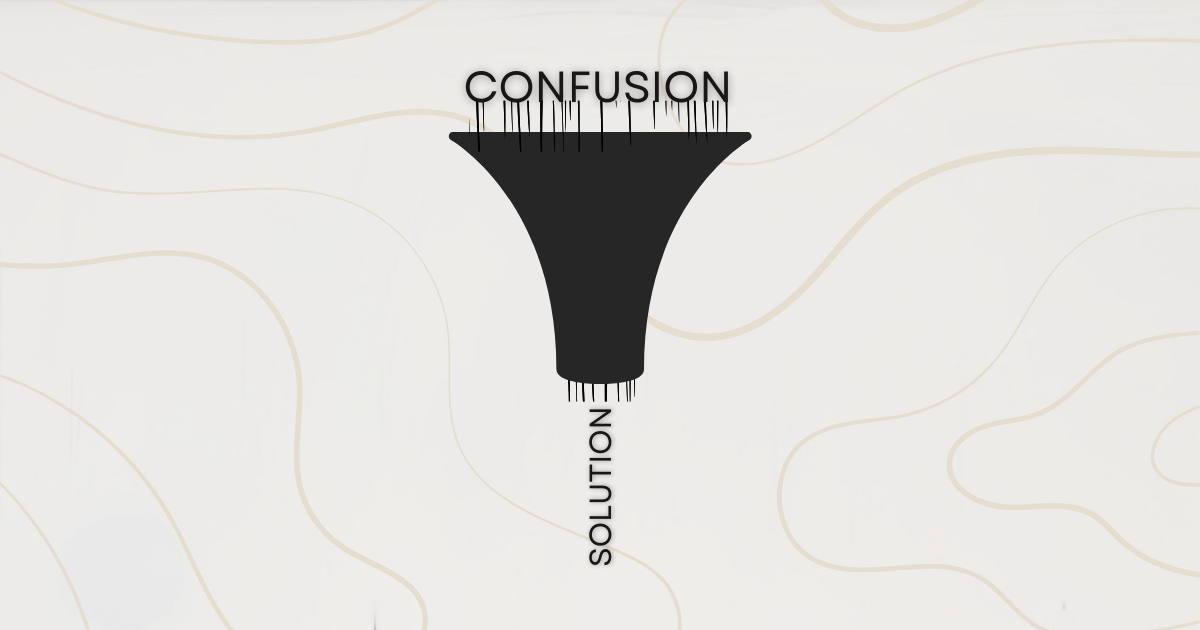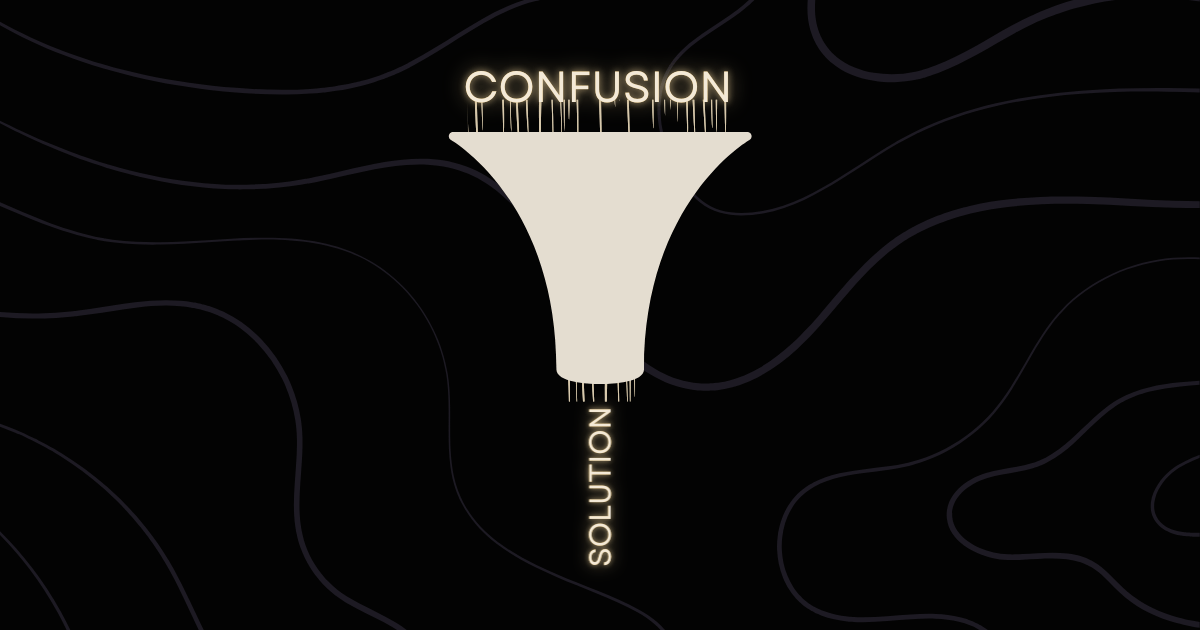December 8, 2024
Picking a Niche Doesn’t Have to Be Hard — Here’s How


Your Mind ↩
You woke up early this morning.
You completed your tasks on time.
Your sleep routine is on track.
These aren’t mere coincidences—they’re decisions.
And honestly, making decisions like these is often the toughest part of our day.
The decisions we make regularly shape our routines. Over time, these routines turn into habits, and habits shape our lives and personalities.
These decisions—small and seemingly insignificant—accumulate, creating either success or disaster in areas like health, wealth, and relationships.
You’ve probably heard enough about how good decisions, once embedded in your subconscious, lead to smooth routines and habits that bring results. These discussions are everywhere, preaching to us daily.
But there are some decisions that require constant effort to make.
People struggle with them.
They can’t decide what they truly want in life.
They get stuck in the bubble of negative thoughts.
They don’t know that one thing they can stick with for the rest of their life.
Meanwhile, others around them seem to have it figured out—whether it’s hanging out with friends, diving into a relationship, or starting a business.
In a broader sense, these decisions seem easy—either live a peaceful life or work your ass off to achieve something meaningful.
But when they choose one path, something feels off.
They start overthinking.
They doubt themselves.
They fail to start.
This cycle makes many feel stuck, believing they’re destined for an average life. The more they reflect on it, the more they feel misaligned with the life they imagined.
Choosing one path often means turning away from the others.
A peaceful, happy life isn’t possible without certain expectations that need to be fulfilled or maintained.
And a stressful, ambitious life isn’t sustainable without the thought of relaxing in the near future.
If you’ve ever felt this way—caught between tough decisions that don’t seem to fit—keep reading. In this talk, I want you to think about how, why, and what conscious decisions look like today, and how they can be made easier.
How to figure out what you want in your life?
Humans are natural generalists.
We’ve always been designed to adapt—to different environments, challenges, and experiences.
Think about it: aquatic life wouldn’t survive if they were thrown into each our territories. They are specialized for their specific environments.
But humans are different. We’ve developed tools—physical tools, yes, but also mental ones. Language, culture, stories, concepts, and even religion—these mental tools allow us to be anywhere and in any situation.
This adaptability is what makes us unique.
And, unfortunately, it's something most people have lost along the way.
As children, we were natural explorers. We loved discovering new things, making mistakes, and learning from them. We touched fire because we didn’t know it would burn.
But somewhere along the line, our learning shifted.
It stopped being about exploring and discovering what we could do. It started being about fitting into someone else’s idea of success.
Parents, teachers, society—everyone around us pushed us into boxes. The things they didn’t like about us, the things that didn’t fit their narrow version of “success,” were squashed. We were taught that there’s only one “right” way to live—a narrow path that society, schools, and institutions shaped for us.
And what is that one true path?
It’s the path that made you feel lost, overwhelmed, anxious, and uncertain about your own future.
It’s the system that tells you, "Follow the formula: get the degree, get the job, and everything will be fine."
But that formula doesn’t work. You were never meant to be just a specialist—a cog in the machine. You were meant to be more. You were meant to explore, experiment, and create your own path, not live someone else's idea of success.
You were trained to specialize.
To become a doctor, a lawyer, an engineer, a designer.
To focus on one narrow identity that limits what you can learn, experience, and achieve.
But by doing this, you failed to develop agency—the ability to decide for yourself, to choose your own path. You lost the freedom to discover and fail on your own terms. You missed the chance to be a free individual, someone who can adapt, grow, and change as they see fit.
In the past, true freedom was about following your own curiosity, your own passions. The greatest individuals—artists, scientists, thinkers—weren’t great because they focused on one thing. They were great because they explored many different areas of life. Their experience wasn’t limited to a single niche—it was vast, diverse, and rich.
You see, a free individual isn’t bound by specialization. They’re not a machine for labor. They are a creator, someone who shapes their own life.
And that forces you stop being a specialist, and start being a generalist—someone who builds their life based on a variety of experiences, knowledge, and skills.
The idea of doing many things might not sit well with the people around you, especially your parents. They’ve been achieved many things by following the conventional rules that are set for them. And they feel the only path to success is the one that involves sticking to something single and predictable, without taking risks.
Feelings Can Be Unknown
The truth is, you’re different.
You’re observant, maybe a bit quiet, hesitant to speak your mind because it feels like no one will listen. So You’ve tried to fit in, trusted others with your future, even demonized success and money, convincing yourself you don’t need them for a good life.
But your ambitious self, still searching for that “one true path.” But the truth is: there isn’t one. If there were, everyone would have it figured out by now.
Life isn’t just about happiness—it’s about contrast. Happiness cannot exist without sadness, and success cannot exist without failure. Life drive on this contrast, not balance.
And always following conventional path doesn’t take you anywhere. You’re not where you want to be because you’re afraid of making mistakes.
Mistakes are nature’s directions—they teach you, refine you, and push you forward. Success cannot exist without failure. Happiness cannot exist without sadness.
The conventional path—school, jobs—can still lead to mistakes, but those mistakes don’t lead to growth. They just keep you stuck to a point where you will be hating but can’t escape.
Things got changed and the way you feel in present situation might differ from what people around see.
They can assume your degree of fulfillment based on their perspective—whether it's your earnings, which they can’t yet match, or the lifestyle you’re living. These external markers may seem like achievements to them, and they may influence your thoughts, making you believe they define success. But, in the end, your true feelings remain unknown to them.
You need to make your own decisions.
You need to start from scratch.
And you can’t overpower yourself to think or start anything.
How to Make Your Life Easier?
Build Your Anti-Vision
If you don’t know what you want in life, start by identifying what you don’t want.
The clearest path to clarity often comes from recognizing what doesn’t align with your values, goals, and future. By eliminating the things you don't want, you get closer to discovering what you truly desire.
A satisfactory life is shaped by many factors—your desires, your definition of success, and the constant barrage of opinions, perspectives, and ideas from those around you. It can feel overwhelming at times because your vision is influenced by the dreams you’ve had, the people you’ve learned from, and the opportunities you’ve encountered. What you’re willing to work for ultimately defines what is possible in your life.
In this pool of uncertainty and conflicting thoughts, it’s no surprise we often struggle to make clear decisions.
We all subconsciously fear the same outcome—failure—and we know that failure looks different for everyone. Whether it’s financial struggles, career stagnation, or draining relationships, we instinctively know these are places we don’t want to be.
Thinking about all these factors can still feel overwhelming when it’s time to make a decision. So let me simplify it for you:
The ultimate failure everyone is trying to avoid is poverty. We don’t want to end up in poverty. It’s a universal truth.
The spectrum of success is different for everyone. When you become aware of the life you don’t want, it becomes easier to make conscious decisions about what you do want. No more overthinking—just take action.
No matter where you want to end up, it’s possible.
So What You do?
-
Make Mistakes
The first step is to put yourself in a position where failure is a real possibility. Why? Because failure is not the end—it’s part of the process.
-
Give yourself three months to try something new
Goldfish grow to fit the take you put them in
Three Months. This is enough time to really know whether it’s something in your capability. Starting something unfamiliar won’t feel easy at first, and that’s okay.
Think about the first time you went to the gym or learned a new skill—it was tough, right? But with time, your body and mind adjust. As you push through the discomfort, you’ll start to see progress. Eventually, you’ll find the challenge becomes addictive.
The same applies to anything you decide to try. When you dedicate time and effort to something new, it grows. You begin to see the bigger picture and get invested. Once you reach that point, the growth, the challenge, and the learning will keep you hooked.
-
You need a real deadline—something that forces you to take action.
Parkinson’s Law tells us that “work expands to fit the time allotted for it.” When you give yourself a deadline, you force your mind to focus and get things done. Without a clear deadline, it’s easy to procrastinate and get lost in distractions.When you set a challenging goal with a deadline, you automatically prioritize what needs to be done. The pressure pushes you to act quickly, learn fast, and figure things out along the way. There’s no room for waiting—you must act now.
This isn’t about making small, incremental changes. It’s about completely flipping the switch—totally revamping how you approach your life.
In one year, you get four chances—every three months—to either discover your capabilities by failing or find a skill you’re obsessed with and include it in your daily routine.
So get mad about what you’re learning. Let the discomfort and the mistakes drive you.
Try out different things to niche down.
That’s it.